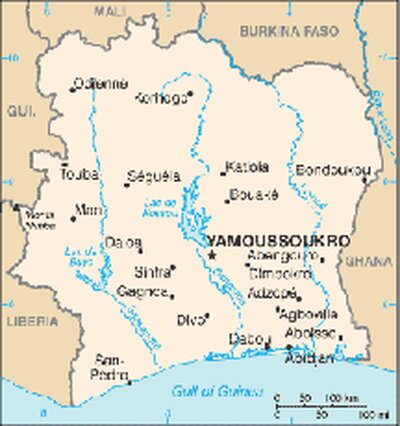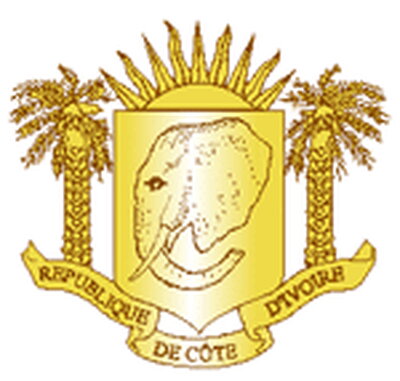

Region: Western Africa
Quick Facts:
- Population: 20.2 million
- Capital: Yamoussoukro : Yamoussoukro has been the official capital since 1983 but Abidjan remains the commercial and administrative center where the US and many other countries maintain their embassies.
- Total Area: 124502 sq miles
- Major Languages: French(official), French (official), 60 native dialects with Dioula the most widely spoken language
- Life Expectancy: 55.34 years (men), 58.09 years (women)
- Literacy: 48.7%
- Monetary unit: Communaute Financiere Africaine franc (XOF)=CFA; note - responsible authority is the Central Bank of the West African States
- Exchange Rate: US $1= 481.83 CFA (December 18, 2008)
- Income (GDP) per capita: $1,700 (2007 est.)
- Broadband users (per 1000) 0.53
- Paved roads: 8.1% of total roads
- Electric Power Consumption (per capita):
- Mobile phone subscribers: 36.59 per 100 people
- Internet Users: 16.4 per 1,000 people
- Internet Domain: .ci
- Country Code: +225
- Time Difference: GMT +0(6 hours ahead of Illinois during Standard Time)
- Climate: Tropical along coast, semiarid in far north; three seasons - warm and dry (November to March), hot and dry (March to May), hot and wet (June to October)
- Type of Government: Republic President Laurent GBAGBO (since 26 October 2000) and Prime Minister Guillaume SORO (since 4 April 2007)
Possible Travel Warning:
Please check the list of current travel warnings.
Historical and Socio-Political Background:
Cote d’Ivoire gained its independence from France on August 7th, 1960. It had become a French colony in 1893. Captain Binger, who had explored the Gold Coast frontier, was named the first governor. He negotiated boundary treaties with Liberia and the United Kingdom (for the Gold Coast) and later started the campaign against Almany Samory, a Malinke chief, who fought against the French until 1898.
From 1904 to 1958, Cote d'Ivoire was a constituent unit of the Federation of French West Africa. It was a colony and an overseas territory under the French Third Republic. Until the period following World War II, governmental affairs in French West Africa were administered from Paris. France's policy in West Africa was reflected mainly in its philosophy of "association," meaning that all Africans in Cote d'Ivoire were officially French "subjects" without rights to citizenship or representation in Africa or France.
During World War II, France's Vichy regime remained in control until 1943, when members of Gen. Charles de Gaulle's provisional government assumed control of all French West Africa. The Brazzaville Conference in 1944, the first Constituent Assembly of the French Fourth Republic in 1946, and France's gratitude for African loyalty during World War II led to far-reaching governmental reforms in 1946. French citizenship was granted to all African "subjects," the right to organize politically was recognized, and various forms of forced labor were abolished.
After independence, Cote D’Ivoire maintained close ties with France. With its successful cocoa sector, it was one of the most prosperous countries in West Africa. However, in 1999, Cote D’Ivoire experienced its first military coup, which overthrew the government. The  Junta leader Robert Guei is said to have rigged elections held in late 2000 and declared himself the winner. However, popular protest forced him to step aside and brought Laurent GBAGBO into power.
Though peace has been restored to the nation, the effect of the political turmoil at the turn of the century has taken its toll. On the one hand, the market potential of Cote d'Ivoire is considered to be substantial. It is one of the largest economies in Sub-Saharan Africa, has a business infrastructure superior to many other countries in the region, and has been an industrial and transportation hub of the region. On the other hand, its political/military crisis  has undermined the economy and investor confidence.
The adult prevalence rate of HIV/AIDS in Cote D’Ivoire is 3.9 percent of the population, and 38 000 HIV/AIDS deaths were estimated in 2007. There is also a very high risk of major infectious diseases, including hepatitis A, diarrhea, and malaria.
Economy:
Cote d'Ivoire is the world's largest producer and exporter of cocoa beans and a significant producer and exporter of coffee and palm oil. Consequently, the economy is highly sensitive to fluctuations in international prices for these products, and, to a lesser extent, in climatic conditions. Despite government attempts to diversify the economy, it is still heavily dependent on agriculture and related activities, engaging roughly 68% of the population. Since 2006, oil and gas production have become more important engines of economic activity than cocoa. According to IMF statistics, earnings from oil and refined products were $1.3 billion in 2006, while cocoa-related revenues were $1 billion during the same period. Cote d'Ivoire's offshore oil and gas production has resulted in substantial crude oil exports and provides sufficient natural gas to fuel electricity exports to Ghana, Togo, Benin, Mali and Burkina Faso. Oil exploration by a number of consortiums of private companies continues offshore. Since the end of the civil war in 2003, political turmoil has continued to damage the economy, resulting in the loss of foreign investment and slow economic growth. GDP grew by 1.8% in 2006 and 1.7% in 2007.
Trade Information:
- Exports: $8.476 billion f.o.b. (2007 est)
- Export Goods: cocoa, coffee, timber, petroleum, cotton, bananas, pineapples, palm oil, fish
- Main Export Partners (2007): Germany 9.7%, Nigeria 9.2%, Netherlands 8.4%, France 7.3%, US 7%, Burkina Faso 4.4% (2007)
- Imports: $ 5.932 billion f.o.b. (2007 est.)
- Import Goods: fuel, capital equipment, foodstuffs
- Main Import Partners (2007): Nigeria 31.1%, France 16.7%, China 7.3% (2007)
Resources for Businesses:
Ivorian Embassy in Washington DC
2424 Massachusetts Avenue, NW,
Washington DC 20008
Telephone no : +12027970300

- Doing Business in Cote D’ivoire (2008) – International Bank for Reconstruction and Development (BDR) publication
- Doing Business In Cote d'Ivoire: A Country Commercial Guide for U.S. Companies
- International Chamber of commerce in Cote D’Ivoire
- Information from the Cote D”Ivoirian embassy
Last updated on 09/23/2009